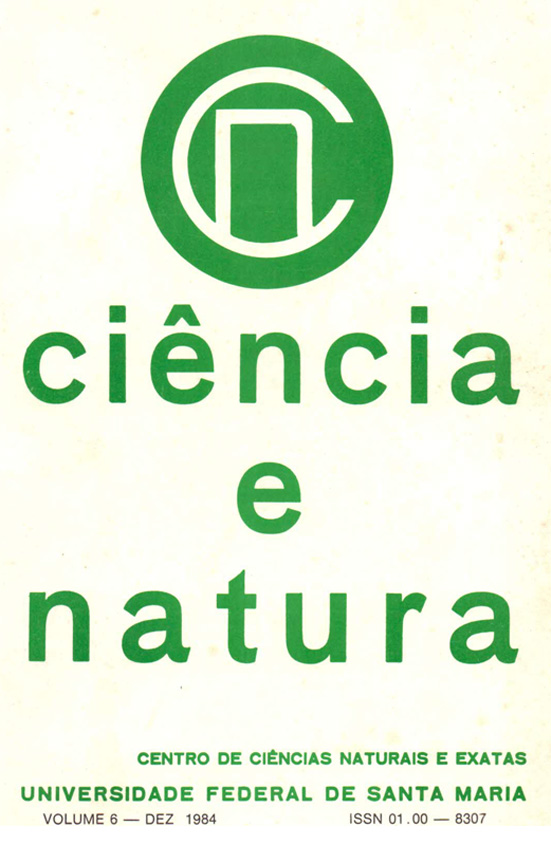Determination of ureatic activity of soy bean cultivated varieties recommended for Rio Grande do Sul
DOI:
https://doi.org/10.5902/2179460X25073Abstract
In order to group soy bean cultivated variety (Glycine max), that makes possible the reduction time of tosting preserving nutritive qualities of soy bean bran and reducing the industrialization cost, was measured the bran urease activity of the 25 cultivated varieties recommended for cultivation in the Estado do Rio Grande do Sul.
It was observed significative difference in the ureatic amoung the most part of the varieties studied. The cultivated variety BR 3 presented the highest activity (3,57mg N/g bran/min 30°C) and the IPAGRO 20 and SANTA ROSA showed the lowest values (0,49 and 0,32). No one variety presented ureatic activity enough low capable of avoinding industrial toasting of its bran.
The authors concluded that is possible the reduction of toasting time for cultivated variety groups with low urease activity.Downloads
References
ADDOR, A.A. Considerações acerca da soja. Rio de Janeiro, Serviço de Informação Agrícola, 1954. 69p. (Brasil. Serviço de Informações Agrícolas, 797).
AMARAL, A. do. Soja e nutrição. São Paulo, Secretaria da Agricultura, Departamento de Produção Vegetal, 1958. 54p.
ANTUNES, P.L. Algumas propriedades físico-químicas e nutricionais das proteínas da soja. Campinas, Universidade Estadual, 1974. 86p. Tese de Mestrado.
ANTUNES, P.L. & SGARBIERI, V. C. Inativação dos fatores antinutricionais da soja. In: REUNIÃO BRASILEIRA PARA O PROGRESSO DA CIÊNCIA, 26. São Paulo, 1974. Suplemento de Ciência e Cultura. 26 (7): 482. 1974. Resumos.
BIRK, Y, & WALDMAN, M. Amylolytic, trypsin-inhibiting and urea se activity in three varieties of soybeans and in soybean plant. Qualitas Plant Mater. Vegetables 12: 199-209, 1965.
BRASIL, Ministério da Agricultura. Centro de Tecnologia Agrícola e Alimentar. Contribuição ao estudo da soja no Brasil. Rio de Janeiro, 1973. 28p. (Boletim Técnico, 10).
CABRAL, L.C. Contribuição ao estudo de farinha de soja integral. Fortaleza, Universidade Federal do Ceará, 1978. 64p. Tese de Mestrado.
COSTA, S.I. da; MIYA, E. e. & FUJITA, J.T. Composição química e qualidades organolépticas e nutricionais das principais variedades de soja cultivadas no Estado de São Paulo. Colet. Inst. Tecnol. Alim., Campinas, 5:305-19, 1973/74.
ROHR, R. Tostagem de farelo de soja. FCTPTA, Campinas, 1971. 10p.
SMITH, A.K.; BELTER, P.A. & ANDERSON, R.L. Urease activity in soy bean meal products. J. Am. Oil Chemists/Soc., 33:360 - 3. (1958).
Downloads
Published
How to Cite
Issue
Section
License
To access the DECLARATION AND TRANSFER OF COPYRIGHT AUTHOR’S DECLARATION AND COPYRIGHT LICENSE click here.
Ethical Guidelines for Journal Publication
The Ciência e Natura journal is committed to ensuring ethics in publication and quality of articles.
Conformance to standards of ethical behavior is therefore expected of all parties involved: Authors, Editors, Reviewers, and the Publisher.
In particular,
Authors: Authors should present an objective discussion of the significance of research work as well as sufficient detail and references to permit others to replicate the experiments. Fraudulent or knowingly inaccurate statements constitute unethical behavior and are unacceptable. Review Articles should also be objective, comprehensive, and accurate accounts of the state of the art. The Authors should ensure that their work is entirely original works, and if the work and/or words of others have been used, this has been appropriately acknowledged. Plagiarism in all its forms constitutes unethical publishing behavior and is unacceptable. Submitting the same manuscript to more than one journal concurrently constitutes unethical publishing behavior and is unacceptable. Authors should not submit articles describing essentially the same research to more than one journal. The corresponding Author should ensure that there is a full consensus of all Co-authors in approving the final version of the paper and its submission for publication.
Editors: Editors should evaluate manuscripts exclusively on the basis of their academic merit. An Editor must not use unpublished information in the editor's own research without the express written consent of the Author. Editors should take reasonable responsive measures when ethical complaints have been presented concerning a submitted manuscript or published paper.
Reviewers: Any manuscripts received for review must be treated as confidential documents. Privileged information or ideas obtained through peer review must be kept confidential and not used for personal advantage. Reviewers should be conducted objectively, and observations should be formulated clearly with supporting arguments, so that Authors can use them for improving the paper. Any selected Reviewer who feels unqualified to review the research reported in a manuscript or knows that its prompt review will be impossible should notify the Editor and excuse himself from the review process. Reviewers should not consider manuscripts in which they have conflicts of interest resulting from competitive, collaborative, or other relationships or connections with any of the authors, companies, or institutions connected to the papers.







